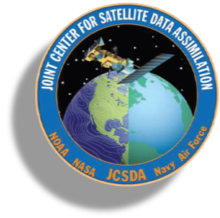the jcsda summer colloquium on satellite data assimilation
July 12-august 7, 2015 - Fort collins, CO
The NASA/NOAA/DoD Joint Center for Satellite Data Assimilation (JCSDA) is pleased to announce a Summer Colloquium on Satellite Data Assimilation in 2015 engaging graduate students and individuals with early postdoctoral appointments in the science of data assimilation for the atmosphere, land and oceans. The program will include internationally recognized experts in data assimilation, satellite data use and assimilation, along with opportunities for students to interact with the lecturers in an informal setting. The objective of the program is to foster the education of the next generation of data assimilation scientists.
Date and Location
The JCSDA Summer Colloquium on Satellite Data Assimilation will take place in Fort Collins, CO from July 27 to August 7, 2015.
Colloquium Topics
The following topics will be covered during the Colloquium:
Data assimilation fundamentals including variational and ensemble techniques
Satellite data applications including infrared and microwave
Satellite data assimilation techniques
Overview of atmospheric, ocean and land data assimilation
Overview of the global observing system
Colloquium Agenda
The colloquium timetable / agenda can now be downloaded here.
Colloquium Presentations
Non-student presentations by day can be found below.
Week One
Monday
A Brief Historical Introduction to Estimation Theory with Eyes on Weather Prediction, Ricardo Todling
Consideration of Dynamical Balances, Ronald Errico
Computational Issues, John Derber
Covariance Modeling, John Derber
Partial Solution Methods, 3DVAR/4DVAR, Liang Xu
Tuesday
Partial Solution Methods, Ensemble, Daryl Kleist
Partial Solution Methods, Hybrid, Daryl Kleist
The Global Observing System, Jim Yoe
Basics of Satellite Observations, Will McCarty
Assimilation of Infrared Radiance Observations, Will McCarty
Satellite Passive Microwave Data: Fundamentals and Considerations for Users, John Forsythe
Wednesday
Global Positioning System (GPS) Radio Occultation, Lidia Cucurull
Satellite-Derived Winds and Numerical Weather Prediction Models, Iliana Genkova
Assimilation of Conventional Observations (and Radar/Cloud) in the Rapid Refresh/HRRR, Stan Benjamin
Thursday
Community Radiative Transfer Model (CRTM) Overview and Tutorial, Paul vanDelst
Non-Gaussian Based Data Assimilation; Lecture 1: Theory, Steven Fletcher
Observing System Simulation Experiments, Nikki Privé
Accounting for Correlated Satellite Observation Error in NAVGEM, Bill Campbell
Friday
Satellite Data Assimilation Applications: Mesoscale, Milija Zupanski
Satellite Data Assimilation Applications: Tropical, Milija Zupanski
The Bias Correction of Satellite Radiance Measurements for NWP, Bill Campbell
Non-Gaussian Based Data Assimilation; Lecture 2: Applications, Steven Fletcher
Week two
Monday
Preparing a Satellite for Assimilation, Ben Ruston
Tuesday
Adjoint Model Basics, Dan Holdaway
Assessing the Impact of Observations on Numerical Weather Forecasts, Ronald Gelaro
Verification and Validation and Successful Metrics, Nancy Baker
Mesoscale Data Assimilation and Validation, Terra Ladwig
Wednesday
Land Surface Modeling and Land Data Assimilation, Jiarui Dong
Thursday
Ocean Applications, Kayo Ide
Aerosol Data Assimilation, Jianlong Zhang
Analysis and Prediction of Clouds Using Satellite Observations, Thomas Auligné
New Sensors, Sid Boukabara
Friday
New Directions, Thomas Auligné
Research to Operations, Sid Boukabara
Closing Remarks, Jim Yoe
Eligibility
Graduate students who expect to receive their Ph.D. in the physical, environmental, atmospheric or related science prior to June 2016 are invited to apply as well as individuals with no more than two years of postdoctoral experience at the time of the Colloquium will be given priority but consideration will also be given to to other year Ph.D. candidates and Masters Candidates as well. Preference will be given to applicants with US citizenship, permanent residency or a valid work/student visa. However, international participation is welcomed if sponsorship can be provided by the home country.
Application Process
There is no application form. Qualified applicants are encouraged to apply by sending the following material:
Curriculum vitae
Statement of interest (no more than one page) with a one-page summary of the applicant's doctoral research
Three supporting letters from faculty members
The above documents should be sent via email by April 30, 2015 to Dr. James Yoe and Ms. Rene Brown.
Candidates will be selected competitively based upon documentation they provide and will be notified of the disposition of their application in April or May.
Financial Support
Travel support to and from the Colloquium, lodging expenses, and per diem will be provided for the two-week program for approximately 15 participants. Additional applicants may be invited to participate, but they will need to provide their own financial support.
Venue
The colloquium will be held at the Cooperative Institute for Research in the Atmosphere (CIRA) at Colorado State University in Fort Collins, Colorado. Detailed logistical information for the Colloquium will be provided to the individuals selected for participation at the time they are notified of their selection.
